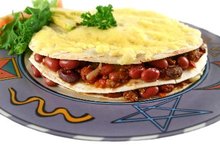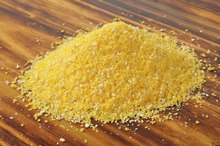What Makes an English Muffin Healthy?
English muffins are often recommended on diet plans as an alternative to bread. English muffins are leavened with yeast and usually dusted with cornmeal. They are most often round, relatively flat and split in half for toasting. Certain types of English muffins are healthier than others, but all can be a healthy addition to any diet plan.
Types
English muffins come in many different varieties, including plain, sourdough, cinnamon raisin, granola, mixed-grain, whole-wheat and light versions. English muffins made with refined white flour do not count as a whole-grain and feature just 2 grams of fiber per serving. Most of these refined English muffins are enriched with extra B vitamins and iron, so they contain 2.3 milligrams of niacin, 54 micrograms of folate and 2.3 milligrams of iron. Unenriched muffins provide just .9 milligrams of niacin, 21 micrograms of folate and .5 milligrams of iron.
- English muffins come in many different varieties, including plain, sourdough, cinnamon raisin, granola, mixed-grain, whole-wheat and light versions.
- Most of these refined English muffins are enriched with extra B vitamins and iron, so they contain 2.3 milligrams of niacin, 54 micrograms of folate and 2.3 milligrams of iron.
Calories and Fat
Are Whole-Wheat Tortillas Healthy?
Learn More
Any type of English muffin can be a healthy addition to a diet plan because it provides portion control. One muffin contains between 120 and 150 calories, depending on the brand and type. English muffins offer just 1g of fat and between 4 and 6 grams of protein. One English muffin counts as two servings of grains according to the USDA Food Guide Pyramid. If you top your English muffin with generous amounts of butter and jam, however, you greatly increase its calorie and fat count and may negate its healthy aspects.
- Any type of English muffin can be a healthy addition to a diet plan because it provides portion control.
Whole Wheat
An English muffin made with 100 percent whole grains, such as whole wheat flour, provides healthy fiber and nutrients. The USDA recommends you consume at least three, 1-ounce servings of whole grains daily -- a whole-wheat English muffin provides two of these servings. You get 4 grams of fiber in a whole wheat muffin -- the Institute of Medicine recommends most adult women consume 25 grams of fiber daily and men 38 grams. Adequate fiber intake helps food move efficiently through your digestive tract and can help lower cholesterol. Whole-wheat muffins naturally provide 2.3 milligrams of niacin, 1.6 milligrams of iron and 6 grams of protein.
- An English muffin made with 100 percent whole grains, such as whole wheat flour, provides healthy fiber and nutrients.
- You get 4 grams of fiber in a whole wheat muffin -- the Institute of Medicine recommends most adult women consume 25 grams of fiber daily and men 38 grams.
Healthy Uses
Nutrition Facts for White Tortilla Wraps
Learn More
Opt for whole wheat or whole grain English muffins as often as possible. You can top one with peanut or almond butter and sliced banana for a healthy breakfast or snack. Top a split English muffin with low-sodium tomato sauce and part-skim mozzarella for a healthy pizza. Use English muffins for hearty sandwiches made with deli ham or turkey, low-fat cheese and avocado slices. English muffins may serve as a healthy stand-in for refined white buns for lean turkey or beef burgers as they generally contain fewer calories and more texture.
- Opt for whole wheat or whole grain English muffins as often as possible.
- Use English muffins for hearty sandwiches made with deli ham or turkey, low-fat cheese and avocado slices.
Related Articles
References
- Medline Plus: Dietary Fiber
- Muffin, English. U.S. Department of Agriculture. Published April 1, 2019.
- English Muffin: Search Results. U.S. Department of Agriculture. Published April 1, 2019.
- Glycemic index for 60+ foods. Harvard Health Publishing. Updated January 6, 2020.
- Bread, white wheat. U.S. Department of Agriculture. Published April 1, 2019.
- Sources of Gluten. Celiac Disease Foundation.
Writer Bio
Andrea Cespedes is a professionally trained chef who has focused studies in nutrition. With more than 20 years of experience in the fitness industry, she coaches cycling and running and teaches Pilates and yoga. She is an American Council on Exercise-certified personal trainer, RYT-200 and has degrees from Princeton and Columbia University.








